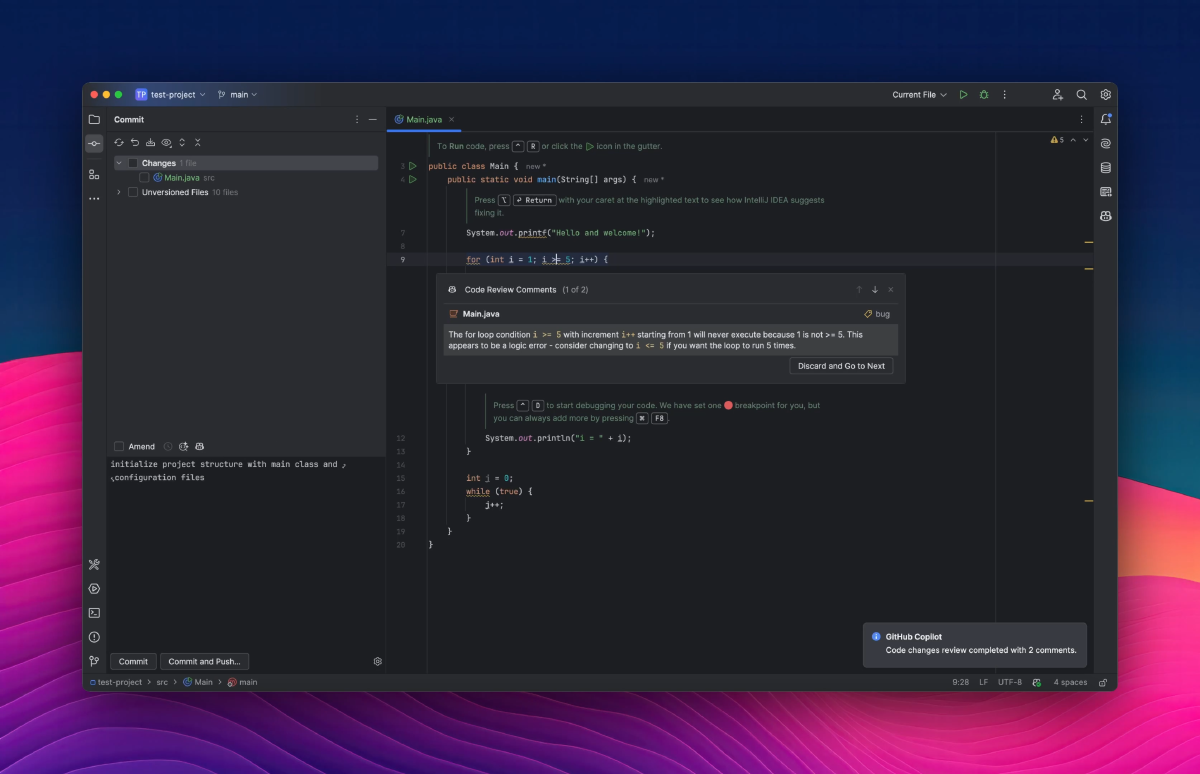Code review is one of the most fundamentally human activities in software development.
GitHub Copilot code review is now available in JetBrains IDEs and Visual Studio, bringing AI-powered code analysis directly into development environments where developers spend their time.
But this raises a delicate question: Can artificial intelligence learn the art of giving constructive criticism?
What Copilot code review brings#
AI-powered code review offers immediate feedback within familiar development environments:
🔍 Real-time analysis#
Instead of waiting for human reviewers, developers get instant feedback on code quality, potential issues, and improvement suggestions.
📚 Pattern recognition#
AI can identify anti-patterns, security vulnerabilities, and style inconsistencies that might be missed in human reviews or catch issues humans haven’t seen before.
⚡ Always available#
Unlike human reviewers who have schedules, priorities, and varying expertise, AI code review is available whenever developers need feedback.
🎯 IDE integration#
Reviews happen where code is written—in JetBrains IDEs and Visual Studio—eliminating context switching and maintaining development flow.
The human art of code review#
Good code review has always been about more than finding bugs:
Building understanding#
Human reviewers help team members understand not just what the code does, but why it was written that way and what alternatives were considered.
Knowledge sharing#
Code reviews are often where junior developers learn from senior ones, and where domain knowledge gets distributed across the team.
Relationship building#
The process of giving and receiving feedback builds trust, establishes coding standards, and creates shared ownership of code quality.
What AI brings to this dynamic#
Copilot code review might change the fundamental nature of the review process:
Consistent standards#
AI applies the same criteria consistently, without the variability that comes from human reviewers having good days and bad days.
Emotional neutrality#
AI feedback doesn’t carry the interpersonal complexity of human criticism—it’s just analysis, not judgment.
Comprehensive coverage#
While human reviewers might focus on certain aspects or miss details when tired, AI can systematically examine every aspect of submitted code.
The thoughtful implications#
What’s lost when code review becomes partially automated? The conversations, debates, and knowledge sharing that happen during human code review often produce insights that go beyond the immediate code changes.
How do we preserve the mentorship aspect of code review when junior developers increasingly receive feedback from AI instead of experienced colleagues?
What’s the right balance between AI feedback and human wisdom? Some insights about code quality, architectural decisions, and business requirements might require human judgment that AI can’t replicate.
The feedback challenge#
Teaching AI to give good feedback is surprisingly complex:
Tone and delivery#
Human reviewers learn to frame criticism constructively, considering the recipient’s experience level and emotional state. Can AI develop this emotional intelligence?
Context awareness#
Good human reviewers understand project constraints, team dynamics, and business priorities that might influence what feedback is most valuable.
The teaching moment#
Experienced reviewers know when to explain not just what’s wrong, but why it matters and how to think about similar situations in the future.
What developers are discovering#
Early users report that AI code review excels at:
- Catching mechanical errors and style inconsistencies
- Identifying security vulnerabilities and performance issues
- Suggesting refactoring opportunities
- Maintaining consistent coding standards
But it’s less effective at:
- Understanding business context and requirements
- Making architectural judgment calls
- Providing mentorship and knowledge transfer
- Navigating team dynamics and interpersonal considerations
The collaboration evolution#
Rather than replacing human review, Copilot code review might change how we collaborate:
AI handles the mechanical#
Let AI catch syntax errors, style violations, and common anti-patterns, freeing human reviewers to focus on higher-level concerns.
Humans focus on strategy#
Human reviewers can spend more time on architectural decisions, business logic validation, and knowledge sharing.
Faster iteration cycles#
With AI handling immediate feedback, human review can happen later in the process or focus on more complex changes.
Getting started#
Copilot code review is now available in JetBrains IDEs and Visual Studio. Try it with different types of code changes to understand what kinds of feedback it provides and how it complements human review processes.
Pay attention to which suggestions feel most valuable and which aspects still benefit from human insight.
Code review has always been about more than finding errors—it’s been about building better developers and stronger teams. As AI takes on more of the mechanical aspects, we have an opportunity to focus on the human elements that make code review truly valuable: mentorship, knowledge sharing, and collective growth.
Try it now: Enable Copilot code review in JetBrains IDEs or Visual Studio to experience AI-powered feedback and discover how it complements human code review processes.


